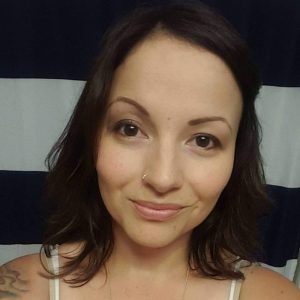How My Experience in Treatment Launched My Career in Psychiatric Nursing
Tiffany Martinez

I was born in Fresno, California and grew up in Maine, on a Native American reservation. I grew up close to my family, and have a twin brother, who is younger than me by six minutes.
Having grown up on a Native American reservation, I’m passionate about my heritage. Even before we moved to the reservation, my mom had sung songs, told stories, and talked a lot about our culture. When we arrived there from California, I remember that it felt more like home.
In fall of 2005, I entered into my freshman year of college. Very early on in the semester, I began to have some noticeable, but subtle signs that something wasn’t quite right.
The way I was thinking about things felt off. My thoughts weren’t coming out the way they normally would. People would ask me questions and I’d answer them honestly, but I’d get strange reactions.
Psychiatric nurse practitioner Tiffany Martinez is using her personal experience with treatment to inform her work and studies focused on improving quality and access to mental health care in rural areas. The way I was thinking about things felt off. My thoughts weren’t coming out the way they normally would. People would ask me questions and I’d answer them honestly, but I’d get strange reactions.
Psychiatric nurse practitioner Tiffany Martinez is using her personal experience with treatment to inform her work and studies focused on improving quality and access to mental health care in rural areas.
I was having difficulty in my classes, and finding it harder than usual to focus and concentrate. My sense of self in the world felt off. I’d hear things. I’d see shadows out of the corner of my eye.
People started to express concern, and I began to feel more paranoid. I’d try to explain that I hadn’t always been this way, while maintaining my own sense of normalcy, and telling myself that I was okay.
When I told my aunt that I just didn’t feel right, she recommended I go see a counselor at the university.

Psychiatric nurse practitioner Tiffany Martinez is using her personal experience with treatment to inform her work and studies focused on improving quality and access to mental health care in rural areas.
I’d been to therapy before for issues like depression, grief, and anxiety, so when the time came to seek help, the process wasn’t foreign to me. In retrospect, that prior experience made it easier for me to seek treatment early on.
I think that first step is often the hardest for young people, especially if they’ve had limited or no interactions with mental health providers.
Entering an Early Intervention Program
It’s difficult to try to tell someone who’s assessing you what’s wrong, while also trying to tell yourself that you’re fine. Plus, not having the language or education around what I was going through made it difficult to explain to others what was happening.
The therapist at the university referred me to the school nurse practitioner, who referred me to the Portland Identification and Early Referral Program (PIER). At the time, PIER was pretty innovative, and specialized in helping people who were in my position.
I was in the right place at the right time, and I was able to access early, specialized treatment. That’s not always the case for young people who are going through what I was going through. I was lucky.
I remember the beginning of treatment as happening very fast.
It was difficult to answer questions like, “Are you hearing voices? Are your eyes or ears playing tricks on you? Do you feel like people are out to get you for no reason?”
I was embarrassed, because my answer was “yes” to many of them.
The more assessments I had done, the more real it became. I was confused and afraid.
When it came time to talk about my family history, I realized that what I was going through was also what my father had struggled with. The therapist at PIER helped me understand more about how these symptoms run in families.
My father has been chronically homeless and in and out treatment for most of his adult life. It saddens me to think how a program I was fortunate to be a part of could have turned his life around. So now I take my experience and his story and use it to keep me driven in this profession. I’d like to give others a chance the way PIER gave me a second chance.
Sure, getting treatment early makes sense, but things can happen so rapidly; it can be a challenge just to wrap your head around what’s going on, especially as a young person. It was overwhelming to be bombarded with so much information, with so little time to process.
My Experience in Treatment
Every month, I’d go in and meet with the psychiatrist and the social worker, and I’d answer questions for research that they were doing at PIER. I also met with the nurse, and did a thorough neuro-psychological assessment which measured memory, processing, and other neurological processes. I was also seeing a therapist on my own, outside of the program.
It took at least a year before I started to feel like myself again. I felt isolated at first, but by the second year I was able to engage more socially, and started to feel more confident in myself and my abilities again.
The comprehensive approach at PIER really worked for me. Medication helped to reduce the symptoms, so that I was able to do the other necessary therapeutic work, like talking about relationships with family and friends, and learning tools to reduce stress.
Figuring out ways to maintain the parts of my life that were most important to me was also important, like succeeding in school and having a social life. I was fortunate to have a couple of close relationships during treatment—with my boyfriend at the time, and my roommate. I think those supports were crucial to my recovery.
Moving Forward
I’d originally wanted to study criminal justice, but in my junior year I began to lean toward social sciences, and chose to major in psychology. I wasn’t sure exactly what I wanted to do at that point, but I knew that I wanted to help people.
I found a job working with adolescent boys with autism and other developmental disabilities, and did that for a long time. I knew I wanted to go to graduate school, but I wasn’t sure whether it would be in counseling, social work, nursing, or another helping profession.
In a chance encounter with a social worker from the PIER program—at a salsa dancing class, of all things—I was introduced to the idea of pursuing a program in psychiatric nursing. As soon as he told me about the details of the program, I knew right away that it was what I wanted to do.
I finished a psychiatric nursing program in May of 2014, and spent two years working in an outpatient psychiatric clinic. I’m still working as a psychiatric nurse, and have been in pursuit of a graduate program to get my doctorate in nursing practice.

Tiffany (center) and her teammates. Because of my personal experience with psychiatric treatment, I think this work comes naturally to me. Clients often express appreciation for having a provider who knows what they’re going through, to some extent.
For those who don’t know my personal story, I think they can sense that I understand what they’re saying, and that I truly hear and listen to them. I remember what things were important for me when I was in treatment, and I try to be mindful that I’m offering those same things.
Future Steps
The focus of my doctorate will be on improving quality and access to mental health care in rural areas—like my Native American reservation—where there is very limited access to mental health care. Even in less rural areas, there are still many barriers to treatment, so I’m interested in addressing issues of access in a broader sense, as well.
As a society, it’s clear that we’re lacking in education for brain health. We don’t have mental health education courses; health classes focus primarily on other aspects of health. We should be educating young people early on, so that they’re able to have conversations about mental health, develop coping skills, and use stress-reduction techniques.
Positive experiences with mental health providers can also go a long way when it comes to seeking help later in life, before symptoms become too difficult to manage. Having had my own prior experience with a therapist before I began to experience symptoms certainly paved the way for me to seek help early on.
-Tiffany
Tiffany Martinez is a psychiatric nurse practitioner interested in early identification and prevention of serious mental illness in adolescents and young adults. She’s also interested in working with multicultural populations, adolescents, autism spectrum disorders, and studying the impact of adverse childhood events.
Listen to Tiffany tell her story: https://youtu.be/Q9tFX4nWkm0
The strength to persist and thrive through mental health struggles exists in all of us. 🫶🏽
Join our Strong365 Community on Instagram, Facebook, and Twitter to keep the conversation going. Or, learn how you can get involved to support us on our mission for mental health.
